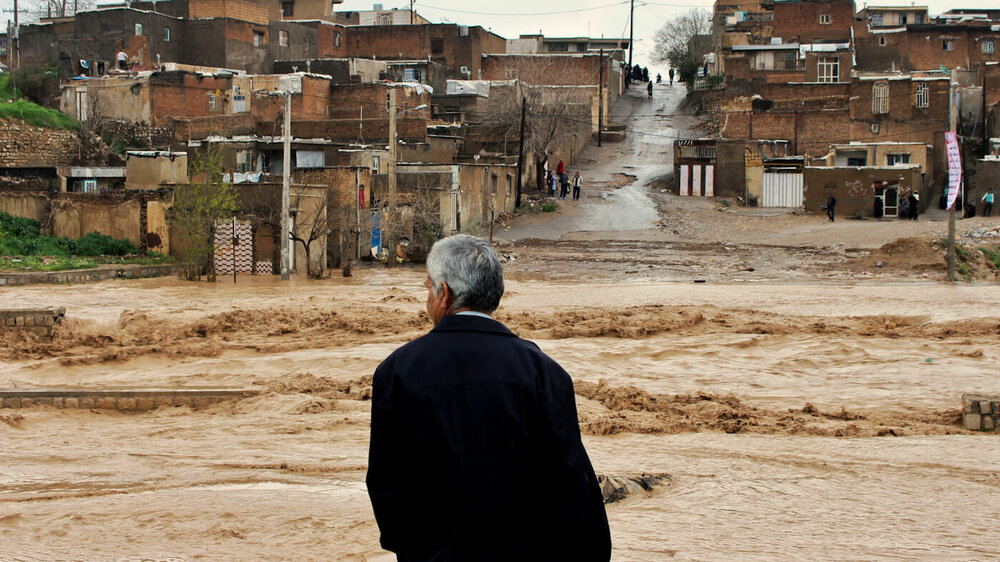Khuzestan Floods: Four days, two villages, one aim

TEHRAN - In southwestern province of Khuzestan, about six miles from the bustling city of Ahwaz, a middle-aged man sat cross-legged beside his small farm along the coast of River Karun.
The farm was devastated in recent deluge that hit the province and all crops were submerged in water. The man, lost in deep reverie, looked at his farm and seemed to be in a state of unfathomable grief.
I somehow mustered courage to sit beside him. He turned to me and asked: ‘Khoobi’ (How are you), I said: ‘Man khoobam’ (I am fine), looking directly into his eyes. I had never been in such a situation before and I struggled for words to console the grief-stricken man.
In my broken Farsi, our conversation picked up and he spoke about his ordeal. “I am here, looking at my farm taken away by water, asking God for His mercy,” he said, and I didn’t know how to respond.
After a brief pause, I looked at the river and asked: “So, has the water level receded after the floods, any relief now?” Without batting an eyelid, he said it has come an inch up, compounding their woes.
I could only imagine his distress and despondency. I didn’t have any more questions to ask so I quietly walked away. I asked myself: should I have asked him these questions? Did my conversation help him?
It was my first day in Khuzestan as part of a group of student volunteers from the holy city of Qom – most of them belonging to Pakistan, India, Nigeria, Yemen and Afghanistan.
We were building a dam using sacks filled with soil and stayed in Ahwaz for four days. We would go for relief and rehabilitation work to the city outskirts where people were battling floods and during those four days I had the opportunity to talk to many locals about their ordeal and loss. It was a life-changing experience for me.
On day one, we labored strenuously to place sacks of soil to build a dam but it was not as easy as we had thought. It was an uphill task as we discovered on day two.
When we woke up and rushed to resume work, we could see the sacks we had placed the day before were already immersed in water. The water level had increased.
During the lunch break I walked up to a local teacher who was helping us. His name was Azeez. I asked him myriad questions regarding floods and he answered patiently. He used his notebook, which had become wet, to explain things to me.
We went back to work only to find that another layer of sacks was submerged in water. I could see frustration on Azeez’s face as he gathered young men to help. A woman interrupted him. Most of their talk was in Arabic but I could understand that she didn’t want her children to get involved in the work.
I asked Azeez why people weren't helping us. He said that the village had two flood-proof structures but they both broke and people lost all hope. Most of them abandoned the village but some stayed back.
Next day we worked in the village of Aluwi. Again, there was no land route leading to the village. We had to go there by motorboats. People used these motorboats to reach the nearest market to buy bread. Ironically, despite water everywhere, people craved for water to drink.
I could see volunteers there from different countries helping people affected by floods. I met volunteers from Lebanon, Syria and Bahrain as well. We spoke different languages but our objective was same.
All the volunteers and aid workers were focused on doing their job to save the lives at risk. Putting humanity first, everyone strived to help people who were affected by floods, who had been rendered homeless, who had lost their belongings, and whose farms were destroyed.
After four days, I realized that these people are extraordinarily brave and resilient. They have withstood both natural and man-made calamities for too long because they are the people of faith and faith keeps hopes in heart alive.
It reminded me of Imam Ali's (as) saying: “Don't let difficulties fill you with anxiety because it is in the darkest night that the stars shine more brightly”.
Writer is an Indian student at Ahlulbayt International University, Tehran.

Leave a Comment